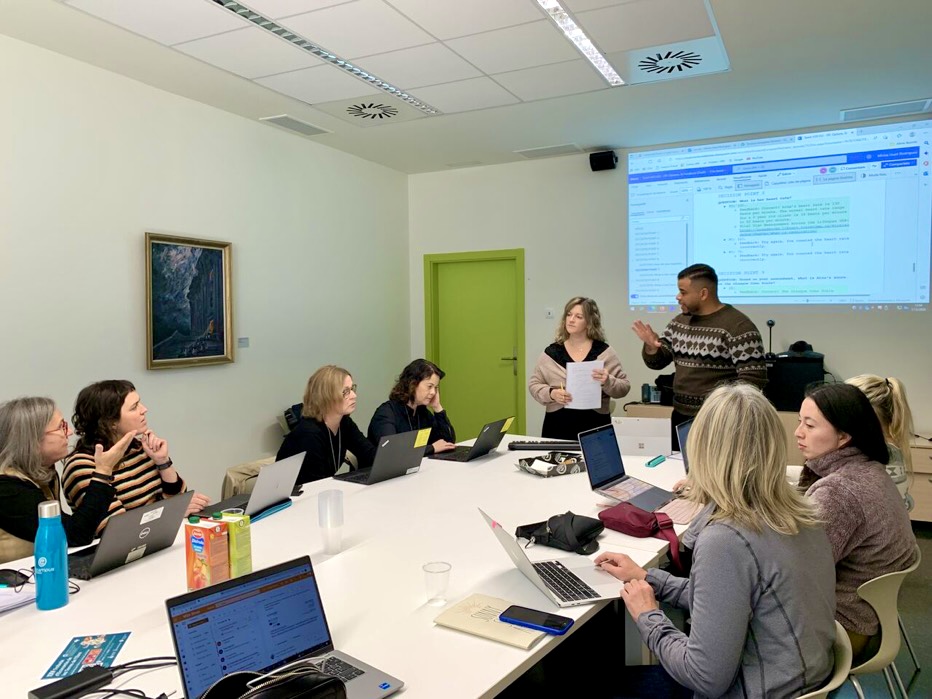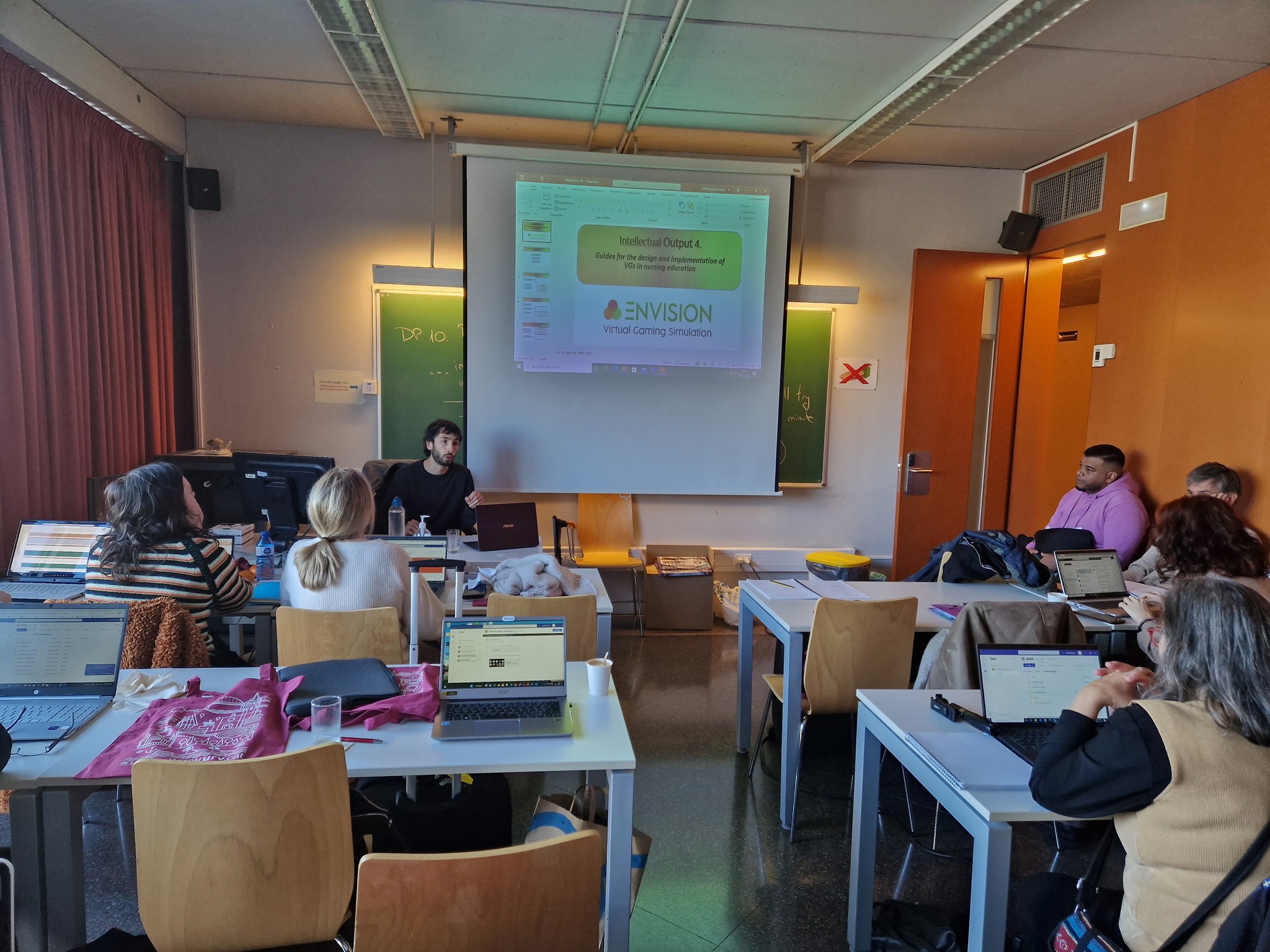Building Partnerships
When designing virtual simulations, it is important to build strong partnerships among the team members. Creating a welcoming, supportive environment for members to share their vision, reflect professional goals, and openly brainstorm scenario ideas can initiate the partnership bonds. When each partner is invested in the development process, an authentic virtual simulation will be created.
During effective partnerships, mentorship and networking opportunities can organically develop. The mentor and mentee relationships can occur at various levels between students, students-faculty, faculty-filming crew, and so on. Being open to each partners’ ideas and feedback, creates learning opportunities for all team members to grow. Thereby, opening opportunities for future collaboration projects.
Global Partnerships
The nursing profession plays an essential role in people’s health and wellness around the world. Members of our team have partnered with nurses locally, nationally, and internationally on various virtual simulation projects. Establishing global partnerships can advance nursing education as it increases accessibility to diverse perspectives, insight into nursing student required competencies, and knowledge about countries’ healthcare systems.
Developing global partnerships between nursing schools can lead to global opportunities for nursing students to learn about the profession in different countries and nursing students practice experiences from around the world. With the advancement of technology, global partners can work together on virtual simulation projects using open platforms to communicate and host the virtual simulation, such as H5P and Pressbooks.
Members of our team were able to experience the impact global partnerships have on designing virtual simulations when we partnered on the ENVISION project with team members from Belgium, Spain, Finland, Slovenia, and Norway. Each partner country identified similar gaps in knowledge nursing students encountered and together designed two virtual simulations that could address these gaps in each country. To learn more about our global partnership, Pascale Vander Meeren from Artevelde University of Applied Sciences in Belgium shares our story.
Global Partnerships: A Creator’s Reflection

In this interview, Pascale Vander Meeren shares her experience leading the European Network on Virtual Simulation Online (ENVISION) international partnership. You can listen and/or read the transcript of the interview in this box.
Can you tell us about the ENVISION project?
Certainly! The ENVISION project, an acronym for the European Network on Virtual Simulation Online, was a strategic partnership funded by the European Commission. Its main objective was to enhance the digital educational readiness of European educators and students in the use and development of Virtual Gaming Simulation (VGS). The project took place from March 2021 to February 2023.
As you know, simulation education plays a critical role in practice-oriented curricula, particularly in healthcare education. However, the COVID-19 pandemic necessitated the suspension of in-person teaching activities, including hands-on simulation sessions. Many European higher education institutions (HEIs) have already invested in simulation education because students appreciate this teaching strategy. They can engage in scenarios and participate in debriefing sessions to experience the real dimensions of their future professional roles. To prevent the pandemic from set backing this pedagogical development, we needed to find ways to embed simulation pedagogy in online applications.
In response to the challenges faced in education during the pandemic, the European Commission launched a project call to enhance digital education readiness. This call provided an excellent opportunity for the consortium and prompted us to write, submit, and ultimately have our project proposal, ENVISION, approved.
What were the aims of the project Envision?
By participating in the ENVISION project, we aimed to develop innovative approaches to simulation education using Virtual Gaming Simulation. Our goal was to create a high-quality, inclusive digital education methodology that would enable educators and students to continue benefiting from simulation experiences in online settings. The consortium brought together education experts and a digital technology provider to establish best practice standards for simulation in online settings.

Throughout the project duration, the consortium successfully developed two Virtual Gaming Simulations: one focused on home health care and the other on emergency pediatrics. These simulations can be utilized in various learning strategies, including blended and in-class teaching. Additionally we developed guidelines to implement the games in a curriculum What initially began as a response to the challenges posed by COVID-19 has now become an integral part of the simulation array. Thanks to the assistance of our Canadian partners, Virtual Gaming Simulations have successfully made their way to Europe.
The ENVISION project had partners from Belgium, Spain, Slovenia, Finland, Norway, and Canada. How were these international partnerships created?
The partnership goes back a long way. It all began in March 2018 when Artevelde University of Applied Sciences (AHS) received an invitation to join a royal mission to Canada. Through this mission, contact was established between AHS and the Toronto Metropolitan, Centennial, George Brown Collaborative Nursing Degree Program. They are the champions of making Virtual Gaming Simulations.
In 2019, Artevelde University of Applied Sciences Ghent was proposed by the Canadian team to participate in the development of the VGS ‘Meal Assistance‘. This collaboration provided an opportunity to gain a better understanding of the development process of a virtual gaming simulation. It was during this time that we discovered the various ways in which these games could be used, including clinical trial preparation, exam assessment, self-test course content, and bridging gaps in clinical experience.
AHS then contacted European Higher Education Institutions (HEI)-partners, taking the first step in building a solid consortium convinced of the possibilities of translating common learning outcomes in European curricula into virtual gaming simulations. Before submitting the Envision project proposal, the consortium held two bootcamps to prepare the project proposal.
What were the benefits of working internationally? How did they enhance the games?
The international collaboration in the development of Virtual Gaming Simulations (VGS) brought numerous benefits to the enhancement of the games.
Firstly, working internationally fostered innovation, creativity, and the exchange of ideas, which significantly broadened the perspective on game development. Instead of creating games tailored to a single audience based on the needs analysis of one group of students, the collaboration allowed us to incorporate international evidence-based materials. As a result, the games now reflect best practices and can be utilized across Europe, from the North to the South and from East to West.
Secondly, the games were enhanced through access to specialized expertise. International projects provide an opportunity to tap into unique skills, experiences, and perspectives from around the world. In the case of ENVISION, European funding allowed us to formalize the collaboration with the Canadian experts. Working with international partners, we had access to specialized knowledge in digital technology, education and VGS-development, which helped in creating high-quality, inclusive digital education methodologies. This ensured that the games meet best practice standards for simulation in online applications.
Furthermore, international projects also offer opportunities for network expansion and the establishment of new professional partnerships. Through our collaboration, we were able to forge meaningful connections with professionals from different countries, expanding our professional networks and fostering future collaborations.
Lastly, these international partnerships not only enhanced the games but also contributed to the growth of the teachers and organizations involved. There was a significant return in learning and knowledge exchange. The ENVISION project facilitated knowledge sharing among partners, enabling the transfer of best practices and fostering professional development. Moreover, the project promoted cultural awareness, empathy, and a global mindset among the participants. It also expanded our professional networks, building relationships, fostering trust, and opening doors to future collaborations and opportunities.
When creating the virtual gaming simulations, what were the challenges to international collaboration and how did you overcome them?
When creating the virtual gaming simulations for the ENVISION project, we encountered several challenges in international collaboration, and we took some specific steps to overcome them.
Firstly, as with any project, thorough preparation was crucial. We defined clear goals, objectives, and effective project and financial planning. Engaging all partners and stakeholders was vital to ensure the project’s success. Building a competent project team was also essential. These aspects are important for any project, not just international ones.

Language proved to be a significant barrier in our international collaboration. English, being the project language, was not the first language for many of the partners. This posed communication challenges at times. You should recognize that it takes more time to work together when language differences exist, and factor that into your project planning. Allocation of additional funding for language support to ensure effective communication was not possible within our budget. Luckily, we could count on the help of Canadian students. But it would surely be a recommendation to provide that.
Another aspect we considered was the different time zones of our team members for online meetings. It was crucial to schedule meetings at times that were convenient for everyone to ensure active participation. Additionally, after online meetings, it is important to provide written communication to recap and repeat important information and documentation. This helps to reinforce understanding and ensure clarity.

Our foremost recommendation for international projects is to truly comprehend the value of in-person meetings. The ENVISION project was initiated amidst the challenging circumstances of the COVID-19 pandemic, which necessitated a wait of over eight months before we could finally convene face-to-face. Thankfully, we organized bootcamps in 2019 and 2020, which were instrumental in building trust and fostering robust relationships. However, it is vital to acknowledge that such connections require continuous nourishment and renewal. To ensure the longevity of fruitful collaborations, it is imperative to reconvene and reinforce the personal interactions. Physical proximity provides a unique and irreplaceable dynamic that cannot be replicated through virtual means alone. Meeting in person, visiting each other’s campuses, and experiencing the work environment, infrastructure, and technology used by our partners helped us learn from and inspire each other.
What advice would you give to people who are interested in collaborating internationally on virtual gaming simulations?
To those who are interested in collaborating internationally on virtual gaming simulations, our advice is as simple as powerful: seize the opportunity and do not hesitate.
To learn more about the ENVISION partnership and to access their resources, visit their site at https://envision-vgs.com/
Student Partnerships
Get students involved at the start. Educators need to promote the student voice by actively listening to the students’ experiences, perspectives, and feedback.
Different ways to collaborate with students include:
- Create an open, safe environment for students to share their voice.
- Provide an opportunity for students to ask questions about challenging content and concepts (e.g., using an anonymous drop box/question box).
- Evaluate students’ perspectives and experiences during and at the end of the course (e.g., surveys, focus groups).
- Host program evaluation discussion groups for students to share feedback about their experiences and the course content.
Acknowledging and integrating student feedback is an integral aspect of being a curriculum champion!
Insights from the Student Team
Reciprocity is required to ensure partnerships are sustainable and healthy. Therefore, students must take active roles in building and maintaining partnerships with peers and faculty members. Here are 4 tips for students when building academic partnerships.
- It is important to develop trust with your team by being transparent, honest, and open. By maintaining open communication, the team can solve problems together.
- Do not be afraid to share your ideas and perspectives. Sharing your thoughts has many benefits including enriching the discussion and encouraging critical thinking.
- Embrace each others’ differences! We are all united by one common goal, but we all bring a unique set of knowledge and skills to the team which will enhance the project.
- Flexibility is key to building partnerships. Projects are susceptible to change, and it is important that students can adapt to these changes. Adjusting your work methods when needed will reduce stress and help you build resiliency.
Educator Tip
 “It is important that virtual simulations are produced with the audience or the user in mind. In nursing, one way that I have achieved this is co-curating simulations with students. Thus, with each virtual simulation, I invite a diverse group of students to co-create the simulations with a team of educators. Since students are the main audience of the simulations we are producing, it is important that their voice informs the design and the content. Their perspective and lived experience is vital to creating a simulation that engages them, inspires critical thinking, and challenges their clinical decision making.”
“It is important that virtual simulations are produced with the audience or the user in mind. In nursing, one way that I have achieved this is co-curating simulations with students. Thus, with each virtual simulation, I invite a diverse group of students to co-create the simulations with a team of educators. Since students are the main audience of the simulations we are producing, it is important that their voice informs the design and the content. Their perspective and lived experience is vital to creating a simulation that engages them, inspires critical thinking, and challenges their clinical decision making.”
~ Dr. Jennifer Lapum, Toronto Metropolitan University
Additional Resources
Virtual Simulation Communities
If you would like to build your virtual simulation community and find new partners, here are a few resources to help you during your search:
Toronto Metropolitan University, School of Nursing Clinical Practice and Simulation Resource has various open access resources, including virtual gaming simulation, actor and mannequin simulations, open educational resources (OER), and scholarship and research articles.
Canadian Alliance of Nurse Educator Using Simulation (CAN-Sim) is a community for nurse educators interested in simulation, including virtual simulation games. You can join the community as a general member, which is free, or a paid member, which includes added benefits.
Simulation Canada has a Virtual Simulation Community of Learning that identifies various free and commercial virtual simulation, research, and educational videos and opportunities for people interested in virtual simulations.

